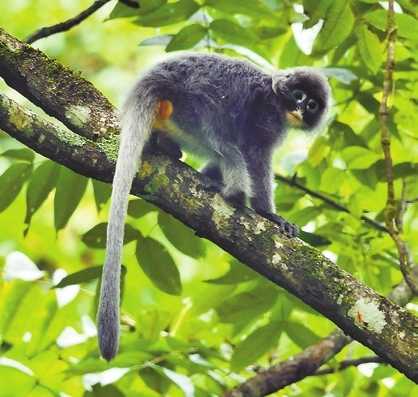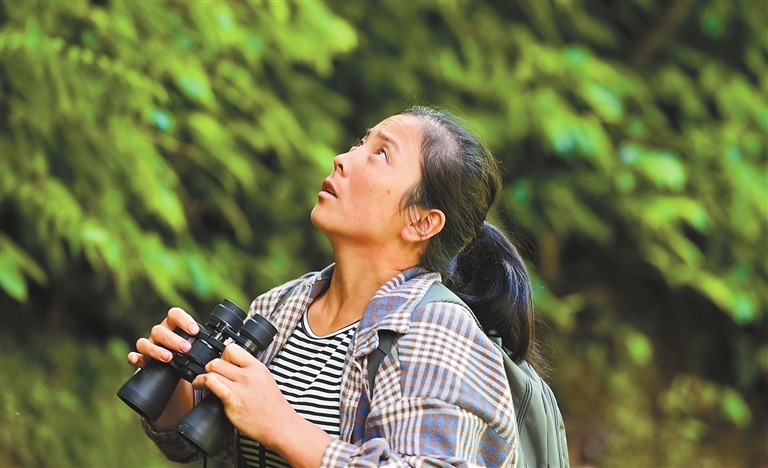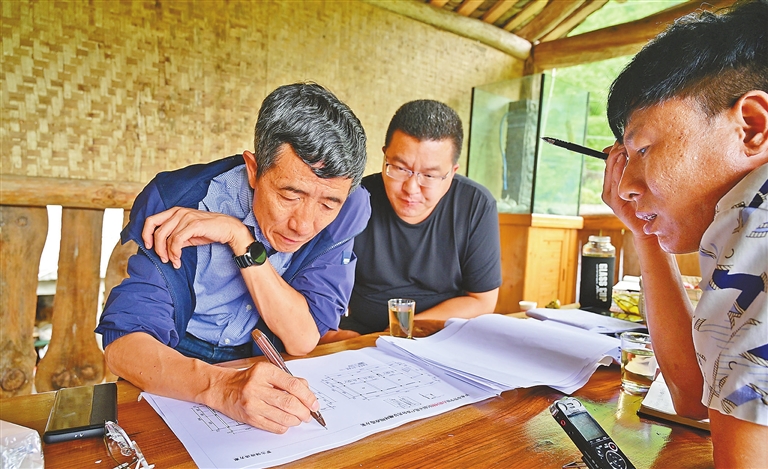


Yu Hongwei, Hou Yufeng hyf@cau.edu.cn LIU BANGQIN was standing by the river gorge, in the hinterland of the three rivers, on the bank of Gutan River, one of several turbulent rivers that flow into the Nujiang River in the Gaoligong Mountains in Southwest China’s Yunnan Province. She was looking through her binoculars and following the swaying cycad trees in the distance, observing the leaping alpine elves — the F. langurs. At Gutanhe, a natural village located on the border between China and Myanmar in Nujiang Lisu Autonomous Prefecture, named after the river, where Han Chinese from Guangdong, Sichuan, Zhejiang and Guizhou migrated more than 100 years ago and became Hakka in the ethnic minority region, their production and life continued to integrate with the local Lisu people and with the surrounding mountains and rivers. As the concept of lush mountains and lucid water and ecological protection has taken root in recent years, it’s commonly seen people living in harmony with nature. ‘Little elves’ in Gaoligong The Gaoligong Mountains, located on the border of China and Myanmar, are a key region of terrestrial biodiversity of worldwide significance and an A-class protected area, as well as the origin of “ancestral mammalian diversification.” Three populations of the F. langurs,which are frequently active along Gutanhe, are among them. This little and naive national-level protected mammal is known for its greenish-gray hair and deep, wide eyes. They are arboreal in nature, dwelling and traveling in groups of dozens, climbing and leaping among the dense wide forest leaves and boulders. F. langurs feed mostly on flowers, fruits and leaves, and the great biological environment of the Gaoligong Mountains provides a suitable living environment for F. langurs. The langurs, as a primate, are diurnal and sleep at night, similar to humans. At midday, they relax and rest in the shade, allowing zoologists to monitor their behavior. Lay hoes down and lift telescopes Liu, a rural mother of two, is now a member of a six-person tracking team of local villagers that has been organized by the Gaoligong Mountains Reserve to get to know the F. langurs, target their areas of activity and lay a solid groundwork for zoologists to study their behavior. Every morning at six o’clock, Liu and her teammates would put on their marching bags, ride their motorcycles and walk through the gorges of the Gaoligong Mountains. When we first followed her up the mountain to see the monkeys, we were at a loss as we held up our binoculars and asked, “Where are they?” “The monkeys are eating leaves on the trees between the two ravines, and there are several of them,” said Liu. “They’re small and not very easy to spot,” she explained. Liu called the F. langurs “good babies” and quietly counted their number and size, “This is the B monkey group; there are more than 40 of them,” she muttered to herself. Eco-photography brings chances To encourage the farmers to go up the mountain, the reserve gives them 180 yuan (US$26) a day. “After F. langurs are born, around 10 days later they come down and eat leaves. My brother discovered this, so he called photographer Zhang Chaojiang. People then organized photographers to come to take photos. They thought this could expand the bird-watching project to shoot monkey photos. They encouraged the reserve to allocate a sum of money. We are very happy that we can support our family and make some contribution to the ecological protection of the country,” said Liu. “In the future, when tourists come, they can observe them as closely as you do. How good! But don’t get too close; don’t scare them,” she added. It is only out of love for this work that the hardworking and simple rural women can run around day after day between these high mountains and valleys, not even having time to eat. They do it for guarding the charming smile of F. langurs and linking ecological conservation and animal protection with regional development. The actions and awareness of the villagers make us feel that spirituality is more important on the road to rural revitalization, which is also an important foundation for achieving material progress. Zhang Zhaojiang is a famous “bird uncle.” At first, local villagers thought he was just a photography enthusiast, but he also has other identities: a member of the Nujiang Prefecture Science and Technology Bureau stationed in Sanhe Village, founder of the Nujiang “Hundred Birds Valley” and promoter of the new environmental business. He has been strongly advocating for the development of bird watching based on the rich bird resources in the Gaoligong Mountains. When he heard about the presence of F. langurs on the mountains, he quickly got on a villager’s motorcycle to capture valuable, clear images of the “little elves,” making their existence known to more people and helping the villagers to promote the development of a follow-up monkey-watching project. We watched the 58-year-old carrying cameras and lenses and walking between the mountains and rivers. He walked faster than young people and was tireless. He always said, “Working with a photographer can let villagers earn 150 to 200 yuan a day.” Each of our workers shines in their own positions, contributing their own strength to drive the regional farmers to get rich. From poverty alleviation to revitalization, he has closely integrated his work, life and rural development together. Lucid water and lush mountains The person responsible for organizing this monkey-watching project is Li Weibiao, director of the project office of the Gaoligong Mountains Reserve. After graduating from the history department of Yunnan Minzu University 28 years ago, he has been stationed here for many years and has formed an inseparable bond with various types of local flora and fauna, injecting his emotions deeply into this land. In recent years, under his coordination, the Nujiang prefecture government has built a series of projects to integrate local culture and tourism and promote local economic development. According to Li, the local government has carried out its protection program of the F. langurs for many years, but letting the villagers follow the monkeys started this year. He said: “Now we cooperate with the Eastern Himalayan Institute team and we can more accurately determine the location of the F. langurs and attract more tourists to experience the diversity of the F. langur habits.” This approach not only strengthens the relationship between local ecological conservation and rural tourism but also drives more local development and increases the income of local people who are then more able to live a good life. Biodiversity brings vitality and hope to rural revitalization Chinese President Xi Jinping has pointed out that the construction of ecological civilization is a thousand-year plan for the sustainable development of China. We must practice the notion that “lucid water and lush mountains are invaluable assets,” adhere to the basic State policy of saving resources and protecting the environment and treat the ecological environment like we would treat our own lives. With years of national publicity and the unremitting efforts of the Nujiang prefecture government, the concept of ecological and environmental protection is deeply rooted in local people’s hearts. The villagers now take the initiative to hand over their adopted monkeys to the reserve, laying a good foundation for the realization of harmony between humans and nature as well as economic and social harmony. Gutanhe Village is now building an experimental demonstration site for rural revitalization with the help of a team of experts from China Agricultural University. In the future, it will provide accommodation and catering facilities for the study programs in the Yaojiaping area with natural ecology, history and culture as the main themes, forming an effective linkage to improve people’s well-being through ecological revitalization. We sat in the courtyard of Liu’s house, enjoying the cool breeze of the mountains in the evening, while they were looking at the mountains in the distance, thinking about something, remembering the “little elves” they saw yesterday or planning the future of the Gaoligong Mountains Reserve. Today, with the joint efforts of this group of people, the F. langurs, once listed as an endangered species on the IUCN Red List, have reappeared in people’s purview. We believe that with the combined efforts of locals, the government, universities and the nation, more wild animals will return to our sight, as we are still in the process of revitalizing rural ecology. (Yu Hongwei is a postgraduate student of China Agricultural University and Hou Yufeng is a lecturer and postgraduate supervisor of Department of Media and Communication of China Agricultural University.) | 
